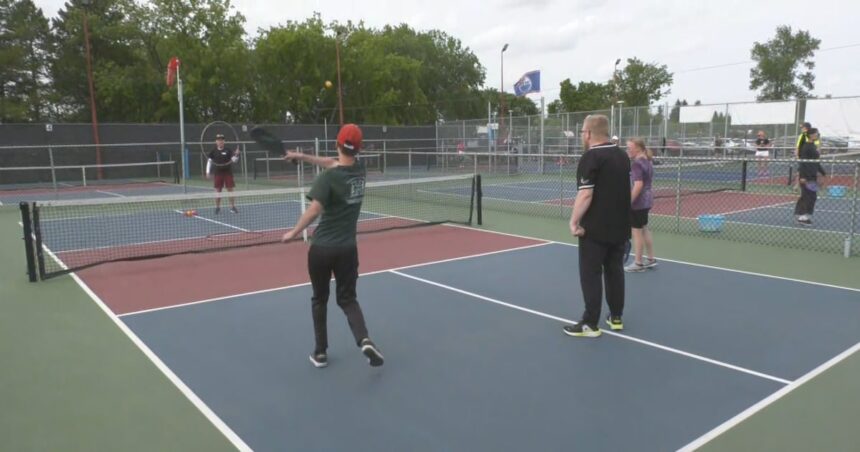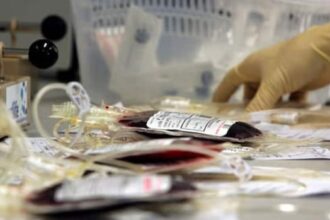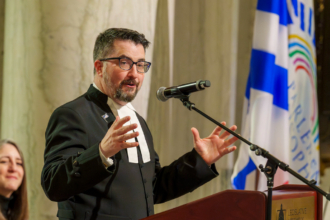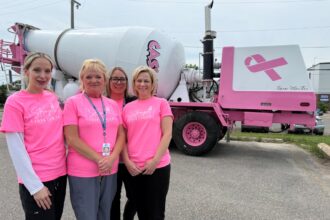In a bustling gymnasium on Edmonton’s north side, the distinctive pop of plastic balls against paddles echoes throughout the space. Here, a group of Special Olympics athletes are discovering the joys of one of North America’s fastest-growing sports: pickleball.
“I love the sport,” says 35-year-old Michael Tedesco, his face lighting up as he successfully returns a serve. “It helps me stay active and I’ve made so many new friends here.”
The Special Olympics Edmonton pickleball program, launched just eight months ago, has already attracted over 20 regular participants who meet weekly to develop their skills and enjoy the social aspects of the game.
Program coordinator Jennifer Walsh explains that pickleball’s appeal extends beyond its accessibility. “We started with just five athletes curious about this sport they’d been hearing about. Now we have a waiting list,” Walsh tells CO24 News. “The combination of simple rules, smaller court size, and the social nature of the game makes it perfect for our athletes.”
The sport, which combines elements of tennis, badminton, and table tennis, has seen explosive growth across Canada in recent years. According to Pickleball Canada, membership has increased by over 300% since 2019, with an estimated 350,000 players nationwide.
“What makes pickleball particularly suitable for Special Olympics athletes is its adaptability,” says sports therapist Dr. Richard Thompson. “The game can be easily modified to accommodate different physical and cognitive abilities while still maintaining its competitive elements.”
For 28-year-old participant Sarah Johnson, who has Down syndrome, the sport has provided unexpected benefits. “Before pickleball, Sarah was reluctant to try team sports,” her mother Diana explains. “Now she’s asking to practice at home, researching rules online, and even saving for her own paddle. The transformation in her confidence is remarkable.”
Local pickleball clubs have embraced the Special Olympics program, with experienced players volunteering as coaches and mentors. Edmonton Pickleball Club president Martin Chen says his members have gained as much from the experience as the Special Olympics athletes.
“Our volunteers initially signed up to teach, but they’ve learned so much about perseverance and joy from these athletes,” Chen says. “Several of our competitive players now regularly include Special Olympics athletes in their practice sessions, which has elevated everyone’s game.”
The program’s success has caught the attention of Special Olympics organizations across Alberta, with plans to expand to Calgary and Red Deer in the coming months. Provincial coordinator Teresa Williams believes pickleball could eventually become an official Special Olympics competition sport.
“We’re seeing tremendous benefits – improved hand-eye coordination, cardiovascular fitness, and social skills development,” Williams notes. “But perhaps most importantly, our athletes are simply having fun.”
For Tedesco and his teammates, the weekly pickleball sessions have become a highlight. As the two-hour practice concludes, high-fives and laughter fill the gym, with several athletes lingering to discuss strategy for next week.
“I’m getting really good at the dink shot,” Tedesco says proudly, demonstrating the soft shot that just clears the net. “Coach says I might be ready for a tournament soon.”
As communities across North America embrace the pickleball phenomenon, these Special Olympics athletes are proving that the sport’s appeal truly crosses all boundaries. With each serve and volley, they’re not just improving their game – they’re changing perceptions about inclusive sports opportunities.
As the program prepares to celebrate its first anniversary, one question remains: will pickleball’s inclusive nature help it become the next breakthrough sport in the Special Olympics movement?























